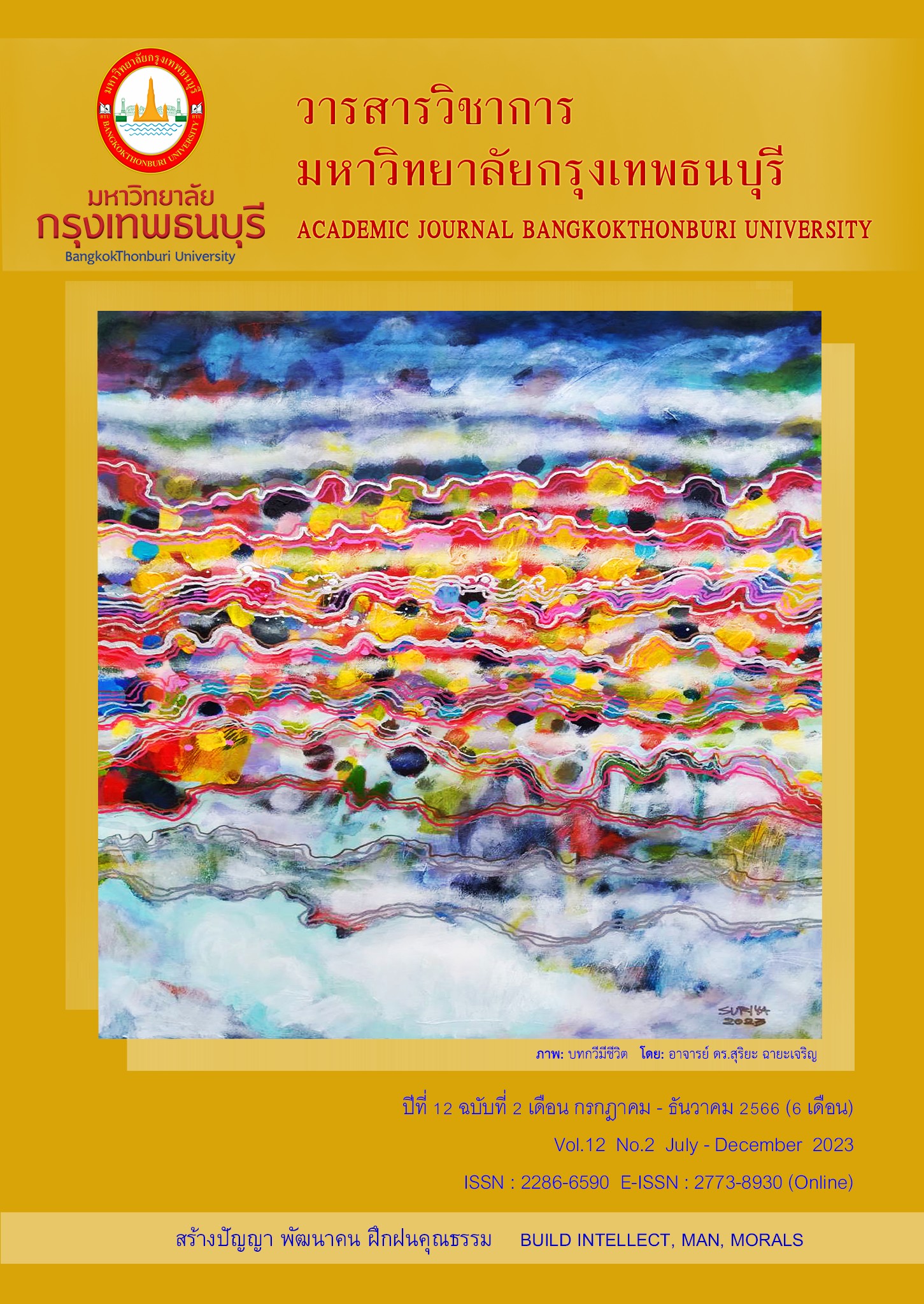ความสัมพันธ์ของปัจจัยที่มีอิทธิพลต่อการพัฒนามาตรฐานการจัดการ
Main Article Content
บทคัดย่อ
งานวิจัยนี้มีวัตถุประสงค์เพื่อ 1. ศึกษาปัจจัยที่มีอิทธิพลต่อการพัฒนามาตรฐานการจัดการ 2. ศึกษารูปแบบความสัมพันธ์ระหว่างคุณภาพการบริการ และกระบวนการบริหารที่มีอิทธิพลต่อการพัฒนามาตรฐานการจัดการ การศึกษาใช้การศึกษาเชิงปริมาณเพื่อทราบถึงข้อมูลพื้นฐานรวมถึงส่วนประสมทางการตลาดกระบวนการบริหารจัดการคุณภาพการให้บริการ จากการศึกษาข้อมูลกลุ่มตัวอย่าง 400 ราย ใช้วิธีวิเคราะห์ทางสถิติได้แก่เครื่องมือทางเทคนิคสถิติ Structural Equation Modeling
ผลการศึกษาสรุปได้ว่าทั้งปัจจัยคุณภาพการให้บริการ และกระบวนการบริหารจัดการมีอิทธิพลเชิงบวกต่อการพัฒนามาตรฐานการจัดการ โดยองค์ประกอบปัจจัยคุณภาพการให้บริการ ตัวแปรที่มีน้ำหนักสำคัญมากที่สุดคือการให้ความเชื่อมั่นต่อลูกค้า และน้อยที่สุดคือปัจจัยทางด้านความเป็นรูปธรรมของบริการ ปัจจัยด้านกระบวนการบริหารจัดการตัวแปรที่มีน้ำหนักสำคัญมากที่สุดคือการจัดการองค์กร และน้อยที่สุดคือปัจจัยทางด้านการวางแผน ปัจจัยด้านองค์ประกอบการบริหารจัดการตัวแปรที่มีน้ำหนักสำคัญมากที่สุดคือการพัฒนาทรัพยากรบุคคล และน้อยที่สุดคือปัจจัยทางด้านกิจกรรมพัฒนาคุณภาพ
Article Details

อนุญาตภายใต้เงื่อนไข Creative Commons Attribution-NonCommercial-NoDerivatives 4.0 International License.
เอกสารอ้างอิง
นงลักษณ์ วิรัชชัย. (2542). โมเดลลิสเรล: สถิติวิเคราะห์สำหรับการวิจัย. (พิมพ์ครั้งที่ 3). กรุงเทพ: โรงพิมพ์แห่งจุฬาลงกรณ์มหาวิทยาลัย.
ปรีชา พงษ์เพ็ง (2558). รูปแบบการจัดการที่มีประสิทธิภาพ ของศูนย์การกีฬาแห่งประเทศไทยจังหวัดสุพรรณบุรี. วารสารบริหารธุรกิจศรีนครินทราวิโรฒ, 6(1). 93-102.
พวงรัตน์ ทวีรัตน์. (2543). วิธีการวิจัยทางพฤติกรรมศาสตร์และสังคมศาสตร์. กรุงเทพฯ: จุฬาลงกรณ์มหาวิทยาลัย.
ฟารีดา มะ. (2564). การจัดการทรัพยากรมนุษย์ที่มีอิทธิพลต่อความได้เปรียบทางการแข่งขันของธุรกิจโรงแรม. วารสารวิชาการ มหาวิทยาลัยกรุงเทพธนบุรี, 10(2). 133-146.
สถาบันรับรองมาตรฐานไอเอสโอ. (2562). มาตรฐานการบริหารความต่อเนื่องทางธุรกิจ ISO 22301 (BCM). สืบค้นเมื่อ 23 ตุลาคม 2566 จาก https://www.masci.or.th/service/.
อาริยา จิรพงศานานุรักษ์, มนทนา อยู่สมบูรณ์, ระเด่น แทนประชา และสมพอน ภูษณะมงคล. (2565). กลยุทธ์ธุรกิจที่ส่งผลต่อคุณภาพและประสิทธิภาพในการให้บริการ. วารสารวิชาการ มหาวิทยาลัยกรุงเทพธนบุรี, 11(2). 186-200.
Best, J., & Kahn, J. V. (1993). Research in Fducation. (7th ed.). Boston: Allyn and Bacon.
Deming, W.E. (1986). Out of Crisis. Boston : The Massachusetts Institute of Technology Center for Advance Engineering Study.
Lovelock C. H. (1996). Service Marketing. Upper Saddle River. New Jersey: Prentice-Hall.
Parasuraman, A., Berry, L. L. & Zeithaml, V. A. (1990). Delivering quality service: Balancing customer perceptions and expectations. New York: The free press.
Nakrem, S. (2011). Measuring quality of care in nursing homes - what matters?. Ph.D. dissertation, Department of Public Health and General Practice, Faculty of Medicine, Norwegian University of Science and Technology.


